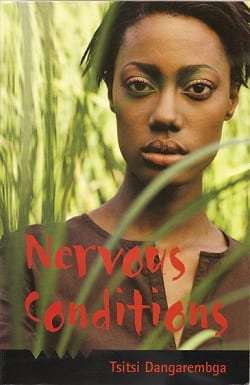‘Quietly, unobtrusively, and extremely fitfully, something in my mind began to assert itself, to question things and refuse to be brainwashed, bringing me to this time when I can set down this story.’
This novel written by Dangarembga, who grew up in Rhodesia (present-day Zimbabwe), explores the psyche of the colonised individual: in particular, the colonised woman. Taking its title from Frantz Fanon’s famous work The Wretched of the Earth (in which he offers a psychiatric analysis of the dehumanising effects of colonisation upon the individual and the nation), Dangarembga offers a powerful and sensitive portrayal of the impacts of the colonial system, which ultimately poisons the sense of self and self-worth of the protagonists.
“It’s bad enough when a country gets colonized, but when the people do as well! That’s the end, really, that’s the end.”
This novel starts with the bold statement that ‘I was not sorry that my brother died’, which instantly draws readers into the complex psyche of Tambu, a young girl in colonial Rhodesia. Her education was not prioritised due to the unchallenged focus on only providing for the education of her brother. Determined to educate herself, Tambu fights against her father’s lack of interest in her education by growing mealies (corncobs) on a small patch of land, with the intention of funding her own schooling. Eventually this leads to her attending school, where she flourishes, and she later takes on her brother’s place at the mission school when he dies. Indeed, this story is in part the narrative of a girl’s fight for her right to education, in a society suffused with patriarchal domination and consequent suppression of the female voice. On the surface, you could see this as a novel encouraging people to fight for their right to an education; however, this work is much darker than this.
Dangarembga communicates the corrosive power of colonial rule upon young women in Rhodesia through several characters, but most significantly through Nyasha, who is the same age as Tambu, but has spent part of her childhood in the UK, due to the education provided for her father by a mission. The influence of ‘The English’ (as they are referred to) leads her towards a struggle of identity, where she finds herself internally (externally) conflicted with the rules presented to her by the society around her, represented by the character of her father. This conflict eventually leads to the deterioration of her own physical and mental well-being; indeed, even those characters who appear more resilient are subconsciously effected by the pyschological residue of English domination over traditional Rhodesian values.
“The problem is the Englishness, so you be careful!” (Ma’Shingayi)
Tambu’s mother uses “Englishness” as an explanation for Nyasha’s dangerous eating disorder, suggesting that anglicisation is a disease. She views the influence of the west as the route of all of Babamukuru’s children’s troubles, representing the postcolonial viewpoint that Western culture ultimately degrades African values, making them struggle to live a life of value that fits with their own society.
“You can’t go on all the time being whatever’s necessary. You’ve got to have some conviction, and I’m convinced I don’t want to be anyone’s underdog. It’s not right for anyone to be that. But once you get used to it, well, it just seems natural and you just carry on. And that’s the end of you. You’re trapped.”
I’d definitely recommend this book for a powerful insight into the colonised mind, and a careful portrayal of the issues related to class, gender and colonial rule, told through the voice of a fiercely determined young girl, which is evidently in part the voice of Dangarembga herself.

